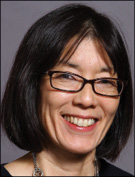Radiologists Take Larger Role in Imaging Addiction
While imaging has played a role in understanding the behaviors of addiction, it has mainly been performed by researchers in psychiatry and psychology who study addiction, according to researcher Jody L. Tanabe, MD.

Yet, it is becoming increasingly important for radiologists to understand the science of imaging as it relates to studying addiction, said Dr. Tanabe, a professor in the departments of radiology and psychiatry at the University of Colorado School of Medicine in Denver. That is one of her goals in moderating a Special Interest Session at RSNA 2018, “Imaging Cognition 2018: Addiction,” which will be co-moderated by David B. Hackney, MD, of Beth Israel Deaconess Medical Center and also assistant dean of faculty and professor of radiology at Harvard Medical School.
In the first of four presentations, Diana M. Martinez, MD, an associate professor of psychiatry at the Columbia University, will give a brief overview of the problem of addiction as understood today, and will follow that with a discussion about the role of PET as a tool in investigating addiction.
“Dr. Martinez is an expert on the role of dopamine receptor system in the brain and how it contributes to drug use,” Dr. Tanabe said.
In addition to talking about the relationship between dopamine receptors and drug addiction, Dr. Martinez will also discuss the correlation between striatal dopamine signaling, drug-related behaviors and treatment response, the status of dopamine imaging across different drugs, and the theory behind addiction as a habitual behavior and its imaging correlates.
In another presentation, John D. Port, MD, PhD, a professor of radiology at the Mayo Clinic in Rochester, MN, will discussthe role of MR spectroscopy (MRS) findings in craving and alcohol. He will review how the reward system homeostasis is disrupted in addiction using alcoholism as an example. Through a review of MRS studies of alcoholism, the session will explore the metabolic abnormalities in craving.
In her presentation, Dr. Tanabe will also discuss functional MRI and the role it plays in looking at craving and how craving promotes substance abuse disorder.
“Quite a bit is known about the reward system and how drugs usurp the reward system in the brain. There is similarity between the reward system and brain
circuitry of craving,” Dr. Tanabe said, adding that craving is a core aspect of substance abuse.
Dr. Tanabe’s talk will focus on how, in the future, imaging might even be used in the clinic to target areas for neuromodulatory treatment — such as deep brain stimulation or transcranial magnetic stimulation — “to treat or to alter the circuits and hopefully have an effect on addiction, and to do so by possibly reducing craving.”
Dr. Tanabe pointed to movement disorders such as Parkinson’s disease as an analogy to the potential role imaging can play when it comes to addiction. While radiologists play only a small role in the diagnosis of Parkinson’s disease, she noted that imaging is now a clinical standard used to treat a subset of those patients through methods such as deep brain stimulation.
“One take-away is that if we can map the circuit underlying motivated behaviors in addiction, then we are one step closer to modulating that maladaptive behavior,” Dr. Tanabe said.
“We know a lot about the molecular basis for substance abuse,” she added. “But I want the audience to get excited about the fact that it is really important for radiologists to understand how we might possibly use imaging in the future to treat substance abuse.”

Addiction Focus of RSNA Special Interest Session
The RSNA 2018 Special Interest Session, “Imaging Cognition 2018: Addiction,” will be held Monday,
Nov. 26, 4:30-6 p.m. — SPI22
Addiction in America 2018
Diana M. Martinez, MD
— SPSI22A
PET as a Tool in Investigating Addiction
Diana M. Martinez, MD
— SPSI22B
fMRI in Addiction
Jody L. Tanabe, MD
— SPSI22C
MRS in Craving with a Focus on Alcoholism
John D. Port, MD, PhD
— SPSI22D
Panel Discussion
David B. Hackney, MD
Jody L. Tanabe, MD
— SPSI22E
Add RSNA 2018 courses to MyAgenda on Meeting Central at Meeting.RSNA.org.